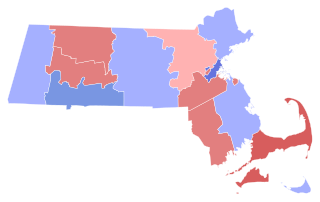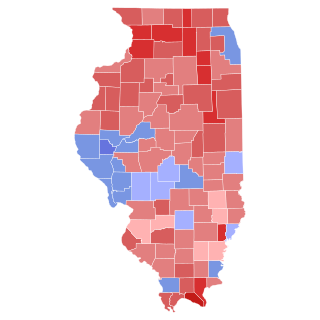
Charles Warren Fairbanks was an American politician who served as the 26th vice president of the United States under President Theodore Roosevelt from 1905 to 1909. A member of the Republican Party, Fairbanks was previously a senator from Indiana from 1897 to 1905.

Vermont has been represented in the United States House of Representatives by a single at-large congressional district since the 1930 census, when the state lost its second seat, obsoleting its 1st and 2nd congressional districts. There were once six districts in Vermont, all of which were eliminated after various censuses.

The 1978 United States Senate elections were held on November 7, in the middle of Democratic President Jimmy Carter's term. The 33 seats of Class 2 were contested in regular elections. Special elections were also held to fill vacancies.

William Squire Kenyon was a United States senator from Iowa, and a United States circuit judge of the United States Court of Appeals for the Eighth Circuit.

The 1912–13 United States Senate elections were held on various dates in various states. They were the last U.S. Senate elections before the ratification of the Seventeenth Amendment in 1913, establishing direct elections for all Senate seats. Senators had been primarily chosen by state legislatures. Senators were elected over a wide range of time throughout 1912 and 1913, and a seat may have been filled months late or remained vacant due to legislative deadlock. Some states elected their senators directly even before passage of Seventeenth Amendment. Oregon pioneered direct election and experimented with different measures over several years until it succeeded in 1907. Soon after, Nebraska followed suit and laid the foundation for other states to adopt measures reflecting the people's will. By 1912, as many as 29 states elected senators either as nominees of their party's primary or in conjunction with a general election.

Claude Rodman Porter was an American politician and lawyer. He served in both chambers of the Iowa General Assembly and as a United States Attorney, and was a perennial Democratic Party runner-up to Republican victors in three races for governor of Iowa and six races for U.S. senator. In an era in which the Republican Party was so dominant in Iowa that Senator Jonathan P. Dolliver remarked that "Iowa will go Democratic when Hell goes Methodist," Porter twice came closer to winning the governorship than all but one other Democratic candidate of that era. He later served as a member of the U.S. Interstate Commerce Commission for eighteen years.

The 1872–73 United States Senate elections were held on various dates in various states, coinciding with President Ulysses S. Grant's re-election. As these U.S. Senate elections were prior to the ratification of the Seventeenth Amendment in 1913, senators were chosen by state legislatures. Senators were elected over a wide range of time throughout 1872 and 1873, and a seat may have been filled months late or remained vacant due to legislative deadlock. In these elections, terms were up for the senators in Class 3.

The 1890–91 United States Senate elections were held on various dates in various states. As these U.S. Senate elections were prior to the ratification of the Seventeenth Amendment in 1913, senators were chosen by state legislatures. Senators were elected over a wide range of time throughout 1890 and 1891, and a seat may have been filled months late or remained vacant due to legislative deadlock. In these elections, terms were up for the senators in Class 3.

The United States Senate election of 1918 in Massachusetts was held on November 5. Incumbent Republican Senator John W. Weeks ran for a second term in office but was defeated by Democratic former Governor David I. Walsh.

The 1936 United States Senate election in New Hampshire took place on November 3, 1936. Incumbent Republican Senator Henry W. Keyes did not run for re-election.

The 1822–23 United States Senate elections were held on various dates in various states. As these U.S. Senate elections were before the ratification of the Seventeenth Amendment in 1913, senators were chosen by state legislatures. Senators were elected over a wide range of time throughout 1822 and 1823, and a seat may have been filled months late or remained vacant due to legislative deadlock. In these elections, terms were up for the senators in Class 2.

The 1932 United States Senate election in Iowa took place on November 8, 1932. Incumbent Republican Senator Smith Brookhart, a controversial progressive figure within the conservative Iowa Republican Party, was defeated in the June Republican primary by Henry A. Field. Field was in turn defeated in the general election by Democrat Louis Murphy. Brookhart also entered the general election as the candidate of the Progressive Party but finished a distant third.

The 1924 United States Senate election in Iowa took place on November 4, 1924. Incumbent Republican Senator Smith W. Brookhart ran for re-election to a full term in office against Democrat Daniel F. Steck.

The 1934 United States Senate election in New York was held on November 6, 1934, to elect a U.S. Senator. Incumbent Democratic Senator Royal Copeland was re-elected to a third term in office, though he would die in office in 1938.

The 1954 United States Senate special election in California was held on November 2, 1954, to elect a U.S. Senator to complete the unexpired term of Senator Richard Nixon, who resigned on becoming Vice President of the United States following the 1952 presidential election. Incumbent Republican U.S. Senator Thomas Kuchel, who had been appointed by Governor Earl Warren, won election to the remainder of the term, defeating Democratic nominee Sam Yorty.

The 1918 United States Senate election in Illinois took place on November 5, 1918.

The 1922 United States Senate election in California was held on November 7, 1922. Incumbent Republican Senator Hiram Johnson was re-elected to his second term in office.

The 1922 United States Senate special election in Iowa took place on November 7, 1922. Republican Smith W. Brookhart was elected to complete the unexpired term of William S. Kenyon, defeating Democrat Clyde Herring.

The 1926 United States Senate election in Connecticut was held on November 2, 1926.

The 1944 United States Senate election in California was held on November 7, 1944.























